The issue we had to deal with this morning was getting out of our box in the marina by 09:30 in order to arrive in time for a bridge opening, but we had insufficient room behind us to reverse out due to a raft of boats behind us. I had mentioned this to the harbour master. "Don't worry," he said, "I will soon move them," he added with a mischievous grin.
As the appointed hour approached, I went to inform the harbour master that our departure was imminent, and by chance I met a young woman from the nearest boat, the one that needed to move. "Goedemorgen, spreekt u Engels?" I asked. "Yes, I speak English," she replied. I explained to her our need to extract our boat imminently, and wondered if she would mind moving it for a short while. "No problem," she replied, "My husband and I will take it further up the marina so that you can get out." I thanked her enthusiastically, and within a couple of minutes they had motored further along, and Meryl and I managed to walk Duonita out of the box.
Within a few more minutes we were back in the Nieuwe Gouwe, passing a huge barge disgorging its cargo of soil, and then rounding the corner into the Gouwe where we tied up at a waiting place for the rail and road bridges to open. We were joined by a German, a Dutch and a French yacht. Large barges passed up and down the Gouwe as we waited, some entering or leaving the Nieuwe Gouwe.
Once through the bridges, we moved as a convoy up through the Gouwe, encountering many more bridges which were opened up as and when boats required to pass.
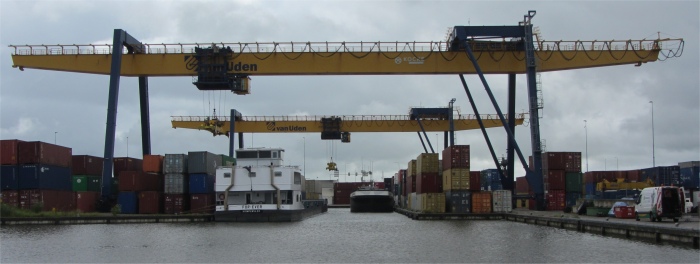 Container Depot for Barges |
Torrential downpours reduced visibility, so much so that one of our convoy chums put his navigational lights on. By strange coincidence, each time Meryl and I needed to jump into action such as approaching a bridge, the gods looked unfavourably on us and showered us with torrents of rain. Rex decided to make an adjustment to one of the windscreen wipers, and managed to break it in the process. A born engineer, our Rex.
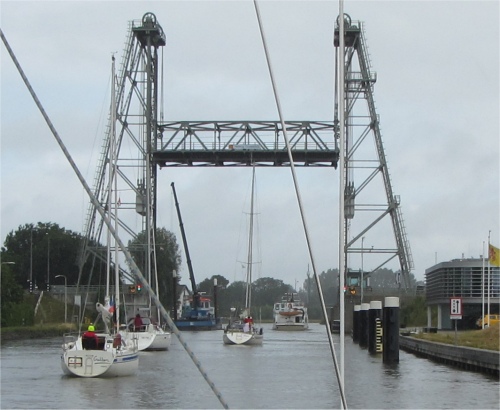 Bridge Hoisting |
The odd barge or two met us on the way, pulling a wake along them that rolled along the tops of the dykes and also rocked Duonita alarmingly in the narrow waterway.
We were hampered somewhat by the German yacht, which lost confidence every time a bridge or barge was encountered, slowing down or even reversing without looking at the craft around him. Despite this, international relations were not broken.
We turned off the Gouwe at Alphen aan den Rijn, and entered the Oude Rijn waterway. As we traversed the town, we came across a string of contiguous bridges. It was at one of these bridges that all four craft were gilling about, waiting for it to open. Then, to Rex's horror, a large barge came up behind us. This created mayhem, scattering all the yachts in all directions out of the way of this silent, hovering, intruding monster. We had less room to manoeuvre, and tried to tie up to a post, but the wind was playing havoc with the boat. Our bow swung round over someone's garden. The owner of the garden, an elderly lady, came out of her home. "It is so difficult," she piped up with a cheery face. "Do you want some help?" It was very kind of her, but we had to fend for ourselves on this one.
Eventually, we got through the bridges, and turned up into the Heimanswetering, which brought us out into a large expanse of water, the Braassemermeer. At the northern exit of this Meer, we entered the Oude Wetering. At the far end we encountered a T-junction. Four years earlier, Rex, Alan and I had turned right here to head up to Amsterdam. Today we turned left into Ringvaart van de Haarlemmermeerpolder. This waterway marked the boundary between North Holland and South Holland. The South Holland side of the waterway had a long length of its banks festooned with water craft. Many must have had permanent moorings since they had neat little gardens established beside them. Acres of greenhouses came into view, with a small cruise vessel tied up to the banks beside the complex. No doubt all the old dears on it were being given a tour around a flower producing farm.
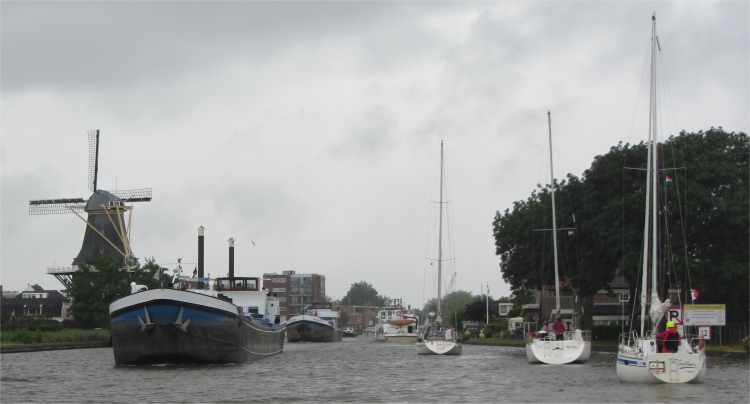 Busy Waterway for the Convoy |
We followed the Ringvaart van de Haarlemmermeerpolder around a sweeping corner, but were immediately confronted with a sequence of three bridges that abutted each other. Again much gilling about in the wind was required, but at last we saw the bridges open in quick succession. Immediately they were open, a convoy of vessels sped through heading south, at such a pace that our convoy of four were forced to scatter in all directions. The oncoming vessels just ploughed through the middle of us. Once they had passed through, all four yachts headed towards the open bridges, only to see them close before our eyes. The German captain threw his hands in the air, turned around and sped off back in the direction from whence we had come. We and the other two boats tied up to a waiting staging area and checked out the bridge opening times. We discovered that the bridge opens alternatively for north bound, and later south bound traffic. We would have to wait another four hours for our north bound slot. After an extraordinary general meeting, we too decided to head back to the Kaagsdorp marina and pitch up there for the night.
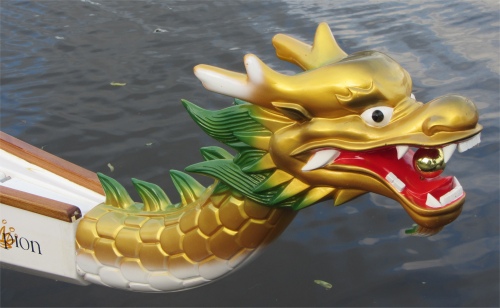 Dragon Head |
Soon we were moored up in a box way too big for Duonita. In short time I discovered from the chap who ran the marina restaurant that the nearest shops were a short car ride away. In addition, in order to make an excursion to Leiden, we would need to get the ferry across the Ringvaart, take a bus to Nieuw-Vennep, and then take a train down to Leiden.
Around 7pm we sauntered down to the little bar and restaurant that served the marina. The harbour master was sitting at the bar enjoying his tea. Observing that he had an interesting combination on his plate, I asked him what he was eating. "Varkens sate," he replied (pork sate). "I recommend the spare ribs," he added. Hmmm.... so why was he eating the sate? We made our choices and tuned into the German and Dutch conversations around us. As far as I could tell, we were the only British around. The food was good and reasonably priced.
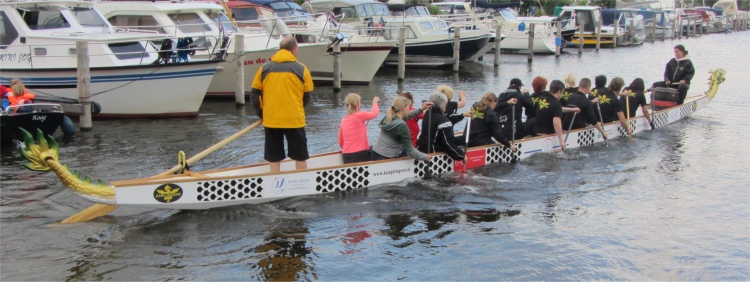 Dragon Boat |
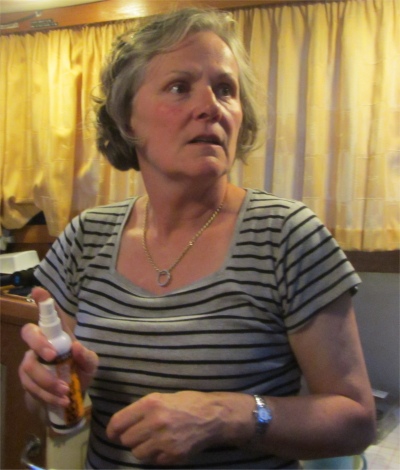 Meryl on a Determined Mission to Kill Mosquitos, Deet in Hand |
Meanwhile, back on Duonita, Meryl could be seen in all sorts of weird, awkward poses as she pursued her new found career in mosquito spotting and eradicating. When she appeared to be dreamily staring into space, she was actually scanning every inch of the boat looking for them. She emitted yelps of joy as another of the little demons bit the dust.
The sound of the beating drum returned, and the "Dragon Boat" glided by, with all the crew looking as though they had had a good workout. Then the rains came.
I remember the constant drone of an endless convoy of planes fly overhead through the pitter-patter of the rain. We were on the flight path for Schiphol airport.
